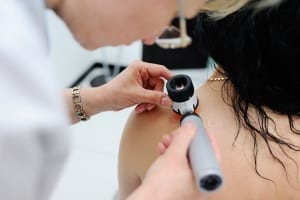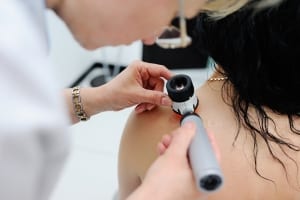 Your skin doctor can be an excellent resource for both information and effective treatments. That’s something a lot of teenagers know, as 40% of those in their mid-teens have acne or acne scars that need to be treated by a dermatologist. But did you know that your dermatologist does way more than help with acne? In addition to conditions like psoriasis, eczema, and even skin surgery, you’re able to see your local dermatologist for a lot of other skin problems. They may even be able to help with issues you might assume have nothing to do with your skin health at all! Here are six surprising reasons that you might want to pay a visit to your skin doctor.
Your skin doctor can be an excellent resource for both information and effective treatments. That’s something a lot of teenagers know, as 40% of those in their mid-teens have acne or acne scars that need to be treated by a dermatologist. But did you know that your dermatologist does way more than help with acne? In addition to conditions like psoriasis, eczema, and even skin surgery, you’re able to see your local dermatologist for a lot of other skin problems. They may even be able to help with issues you might assume have nothing to do with your skin health at all! Here are six surprising reasons that you might want to pay a visit to your skin doctor.
- Hair Loss or Itchy Scalp: It’s easy to forget that your scalp is part of your skin, too. If you’re experiencing itching, flaking, or redness, it could be attributed to dandruff, psoriasis, dehydration, or another health condition. And if you’ve noticed excessive hair loss, it’s possible you have an undiagnosed autoimmune or thyroid condition — or it could be caused by stress. Your dermatologist should actually be your first stop to find out what’s causing the issues on your head.
- Dry Skin: Although ample oil production can cause many of the issues we associate with acne, having overly dry skin can be a problem too. It’s common to experience dry skin during the wintertime; after all, the air has less moisture and the constant switch from the freezing outside to the heated inside can wreak havoc on your skin. But if you notice any kind of sudden change in skin, including how dry it is, you may want to book an appointment. It’s possible that you simply need to amp up your use of moisturizer or a medication could be to blame. In some cases, it could be caused by your thyroid. It’s best to check with a professional rather than ignore the problem.
- Excessive Sweating: If it’s hot outside, you’re nervous, or you just worked out, you’re going to be sweaty. But if it’s an ongoing problem and disrupts your life, your skin doctor may be able to help. It’s possible you’re dealing with hyperhidrosis, which is often treatable with a few different methods. While the condition can be a source of embarrassment for many people, there’s no reason to feel ashamed — so be sure to contact your dermatologist if you think something is amiss.
- Lingering Sores: Many of us experience little sores from time to time. But if they don’t go away or are a worsening source of pain, it’s time to get them checked out. What you first thought was a zit or a cold sore could actually be a mouth ulcer, a cyst, an ingrown hair, a wart, an infection, or even a sign of cancer. If the sore doesn’t heal within a few weeks, keeps coming back, or causes you pain, talk to your skin doctor to get a definitive diagnosis and a recommended treatment.
- Irritated Eyes: Believe it or not, eye irritation could be a reason to go to the dermatologist. If it has anything to do with the mucous membranes, your skin guru can take a look. It could possibly be attributed to pink eye, conjunctivitis, or environmental irritation. Your dermatologist will be able to assess whether the problem is related to the skin and can provide treatment based on the diagnosis.
- Nail Problems: The condition of your hair, skin, and nails can actually offer quite a bit of insight as to what’s going on inside the body. If your nails are brittle, broken, discolored, scaly, or pitted, your dermatologist may actually be able to figure out what’s going on. You might be dealing with a fungal or bacterial infection, but it could also be attributed to a nutritional disorder, psoriasis, a thyroid condition, or an internal organ issue. Before you dismiss the problem and cover it up with a coat of nail polish, you might want to ask some skin experts.
We hope this post has proven that your dermatologist can do so much more than prescribe acne medication. To learn more about the conditions we treat and how we can help, please contact us today.






Leave A Comment